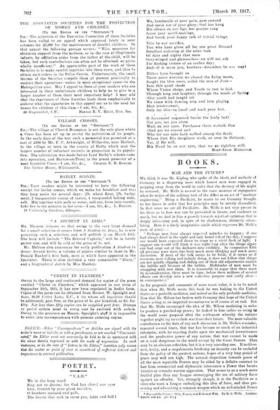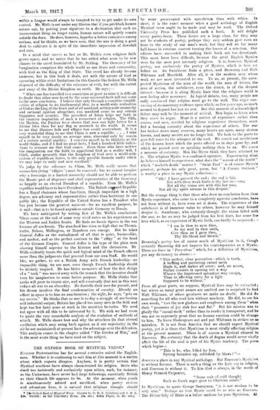B 0 0 K S .
WAR AND THE FUTURE.*
WE think it was Mr. Kipling who spoke of the ideals and methods of Germany as a disgusting mess which honest men were engaged in
mopping away from the world in order that the decency of life might be restored. Mr. Wells is moved to the same measure of repugnance when he writes of the military task of the Allies as an act of " sanitary engineering." Being a Pacificist, he wants to see Germany brought to her knees in order that her principles may be utterly discredited.
In that sense we are all Pacificiets. Mr. Wells is not very precise in his ideas as to how war can be prevented in future, and confesses as muds but we find in him a growth towards mystical optimism that is deeply interesting and, in spite of ith shadowiness, distinctly stimu- lating. Here is a finely imaginative simile which expresses Mr. Welle's state of mind :- " Perhaps men have always expected miracles to happen ; if ono had always lived in the night and only heard tell of the day, l'suppose one would have expected dawn to come as a vivid flash of light. I suppose one would still think it was night long after the things about one had crept out of the darkness into visibility. In comparison with all previous wars there has been much more thinking and much more discussion. If most of the talk seems to be futile, if it seems as if everyone were talking and nobody doing, it does not follow that things are not quietly slipping and sliding out of their old adjustments arnitist the babble and because of the babble. Multitudes of men must he
struggling with new ideas. It is reasonable to argue that there must be reconsideration, there must be time, before these millions of mental efforts can develop into a new collective purpose and really show— in consequences."
As for proposals and comments of more exact value, it is to be noted that when Mr. Wells wrote this book he was looking to the United.
States as a probable mediator, and indeed as the only probable mediator.
Now that Mr. Wilson has broken with Germany that hope of the United States acting as an impartial reconstructor is of course at an end. Not that Mr. Wells encouraged the idea of Mr. Wilson mediating in order.
to produce a patched-up peace ; lie looked to him rather as owing to the world sonic proposal after the settlement whereby the nations
together might try to exclude war from their future. The most valuable contribution to the data of any such discussion is Mr. Wells's reminder. repeated several times, that war has become so much of an industrial enterprise, with its exacting drafts upon the mechanical inventiveness, and the productive power of any nation, that war cannot be made on a scale dangerous to the world except by the Great Powers. That may be an obvious reflection, but it is a very consoling one. If reckless- ness, levity, and a megalomania bordering on insanity can be excluded from the policy of the greatest nations, hopes of a very long period of peace may well run high. The natural disposition towards peace of all the most reputable Powers may be aided by a definite contract to ban from commercial and diplomatic intercourse a Power that breaks treaties or commits wanton aggression. That seems to us a much more fruitful plan than any League stereotyping the use of military force against an offender. Yet, strangely enough, it is the Pacilleists as a class who want a League embodying this idea of force, and thus pre- serving and advertising a common weapon which an evil-minded Power
• War and fl e FOure : ttaty; France, and Britain at Wet. By II. G. Wells. _ London: Costa and Vu. itia. Dtt.j
within a League would always be tempted to try to get under its own control. Mr. Wells is not under any illusion that if you pitchfork human nature out, by putting your signature to a declaration that such an inconvenient thing no longer exists, human nature will quietly remain outside the door. He does, however, hopesfor a better conscience among tuitions, and he thinks, as we have seen, that the war is doing a good deal to cultivate it in spite of the immediate impression of downfall and ruin.
In a mind that moves as fast as Mr. Wells's even religious faith grows apace, and we notice that he has added what seem to be new clauses to the creed formulated by Mr. Britling. The theocracy of his imagination comprises the whole world as one State and community, with God as the King of that State. The creed has already become immense, but in this book it deals, not with the nature of God as operating within strict limitations (in this Gnostic-like fashion Mr. Wells disposed of the difficulty of the existence of evil), but with the extent and sway of the Divine Kingdom on earth. He says :- " When one has travelled to a conviction so great as mine it is difficult to doubt that other men faced by the same universal facts will not come to the same conclusion. I believe that only through a complete simplifi- cation of religion to its fundamental idea, to a world-wide realisation of God as the king of the heart and of all mankind, setting aside monarchy and national egotism altogether, can mankind cone to any certain happiness and security. The precedent of Islam helps my faith in the creative inspiration of such a renascence of religion. The Sikh, the Moslem, the Puritan have shown that men can fight better for a Divine Idea than for any flag or monarch in the world. It seems to me that illusions fado and effigies lose credit everywhere. It is a very wonderful thing to me that China is now a republic.. . . I take myself to be very nearly an average man, abnormal only by reason of a certain mental rapidity. I conceive myself to bo thinking as the world thinks, and if I find no great facts, I find a hundred little indica- tions to reassure me that God comes. Even those who have neither the imagination nor the faith to apprehend God as a reality will, I think, realise presently that the Kingdom of God over a world-wide system of republican states, is the only possible formula under which we may hope to unify and save mankind."
To judge by the reference to China. Mr. Wells really means that monarchies (being "effigies") must be removed ; but we cannot imagine why a Sovereign in a limited monarchy should not be able to perkrin the Mosaic part of dispenser and chief representative of the theocracy as happily as an elected President of a republic. Even Mr. Wells's republics would have to have Presidents. The British crgred Republic - has a Royal chairman whose functions, though important in a high degree, are advisory and representative rather than hortatory in our public life ; the Republic of the United States has a President who has just become the greatest autocrat—for an excellent purpose, be it said—that is to be found anywhere outside Germany or Russia.
Wo have anticipated by writing first of Mr. Wells's conclusions These come, at the end of some very vivid notes on his experiences on the Western and Italian fronts. He finds no heroic figures in the war because all are heroic. The standard has risen so high that no Them's- twice, Nelson, Wellington, or Napoleon can emerge. But ho takes General Joffre as the embodiment of all that is quiet, businesslike, and modest, and as the perfect contrast to the " effigy " at the head of the German Empire. General Joffre is the typo of the plain man showing himself superior to the histrion and the rhetorician. Mr Wells evidently trusts the quick and logical mind of the French officers more than the judgments that proceed from our own Staff. He would like, we gather, to see a British Army with French leadership—an impossible thing, we are sure, oven though French leadership should be divinely inspired. He has bitter memories of how the first design of a " tank " was waved away with the remark that the inventor should turn his imagination to some better purpose. Mr. Wells thinks that tanks will grow to titanic size, and will eventually (but not in this war) reduce all war to an absurdity. He foretells their uses for pursuit, and his dream involves the final condemnation of cavalry. Already an officer in spurs is to him an anachronism ; the sight, he says, "gets on my nerves." He thinks that as war is to-day a struggle of mechanism and industrial output, Britain has placed too many men in the field and kept too few lusty arms at work in the munition factories. We need not agree with all this to be interested by it, We wish we had room to quote the very remarkable analysis of the evolution of methods of attack. Mr. Wells shows how and why the attackers (in that eternal oscillation which may swing back against ua if our superiority in the air ho not maintained) at present have the advantage over the defenders. This analysis comes in the chapter called " The Grades of War," and is the moat acute thing we have read on the subject.



































 Previous page
Previous page